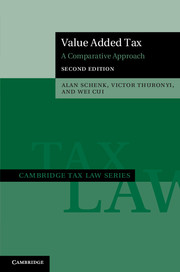Book contents
- Frontmatter
- Dedication
- Contents
- List of Tables and Charts
- List of Cases
- Preface to the Second Edition
- 1 Introduction
- 2 Consumption Tax Forms and Base Alterations
- 3 Varieties of VAT in Use
- 4 Registration, Taxpayer, and Taxable Activity
- 5 Taxable Supplies and Tax Invoices
- 6 The Tax Credit Mechanism
- 7 Introduction to Cross-Border Aspects of VAT
- 8 Timing and Valuation Rules
- 9 Zero-Rating, Exemptions, and Exempt Entities
- 10 VAT Evasion and Avoidance
- 11 Gambling and Financial Services (Other than Insurance)
- 12 Insurance
- 13 Real Property
- 14 An Anatomy of the Chinese VAT
- 15 Interjurisdictional Aspects
- Appendix VATs Worldwide
- Index
- References
13 - Real Property
Published online by Cambridge University Press: 05 February 2015
- Frontmatter
- Dedication
- Contents
- List of Tables and Charts
- List of Cases
- Preface to the Second Edition
- 1 Introduction
- 2 Consumption Tax Forms and Base Alterations
- 3 Varieties of VAT in Use
- 4 Registration, Taxpayer, and Taxable Activity
- 5 Taxable Supplies and Tax Invoices
- 6 The Tax Credit Mechanism
- 7 Introduction to Cross-Border Aspects of VAT
- 8 Timing and Valuation Rules
- 9 Zero-Rating, Exemptions, and Exempt Entities
- 10 VAT Evasion and Avoidance
- 11 Gambling and Financial Services (Other than Insurance)
- 12 Insurance
- 13 Real Property
- 14 An Anatomy of the Chinese VAT
- 15 Interjurisdictional Aspects
- Appendix VATs Worldwide
- Index
- References
Summary
Introduction
One of the most complicated problems in designing a VAT base involves the taxation of real (immovable) property. Although in a sense real property is no different from many goods, in practical terms its extremely long life presents a number of difficulties.
If an economically idealized VAT base were envisaged, it would consist of personal consumption. Most goods and services are consumed shortly after purchase. For these, there is not much difference between this ideal “economic” tax base and the “legal” tax base as defined in VAT laws, namely, the value of goods and services supplied to final consumers. For real property, however, personal consumption takes place over many years (the same is true for other consumer durables). One way of reconciling the legal tax base with the economic ideal is to reason that taxation at the time of first sale of residential real estate is a form of up-front taxation of the consumption value – that is, the legal tax base corresponds to the economic tax base in present value terms. However, the equivalence ceases to hold if the price of the property changes after its initial acquisition. One of the questions that has concerned VAT policy analysts is whether this suggests that there is something wrong with how residential real property is taxed, if tax is imposed only at the time of acquisition. As will be discussed further, it turns out that the answer is not as obvious as some might think.
- Type
- Chapter
- Information
- Value Added TaxA Comparative Approach, pp. 408 - 440Publisher: Cambridge University PressPrint publication year: 2015



